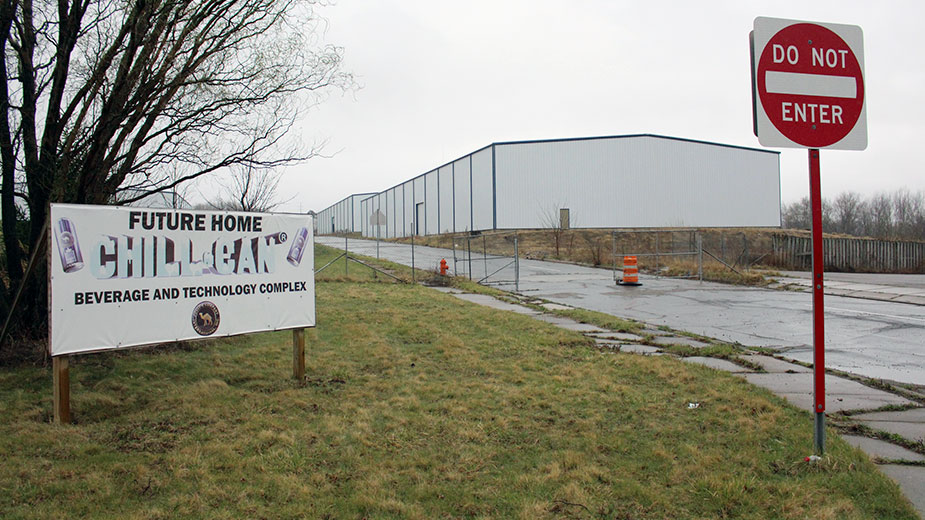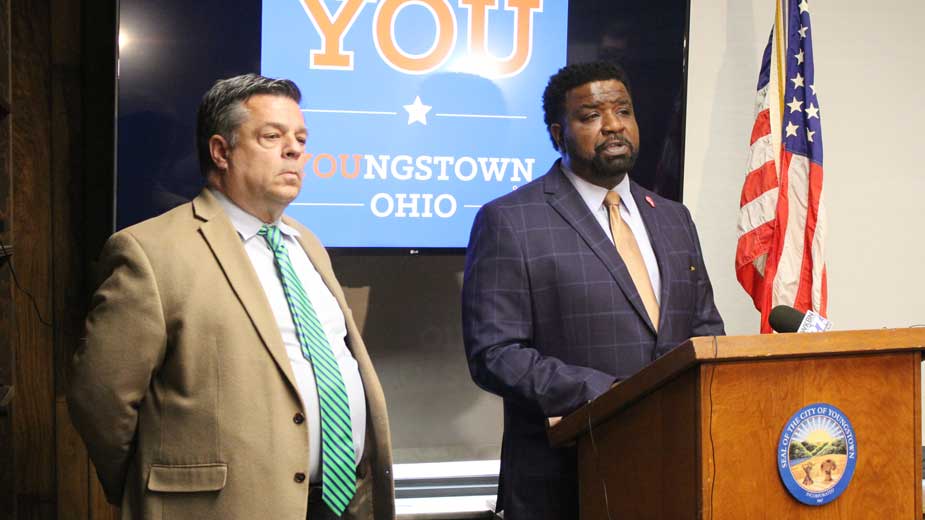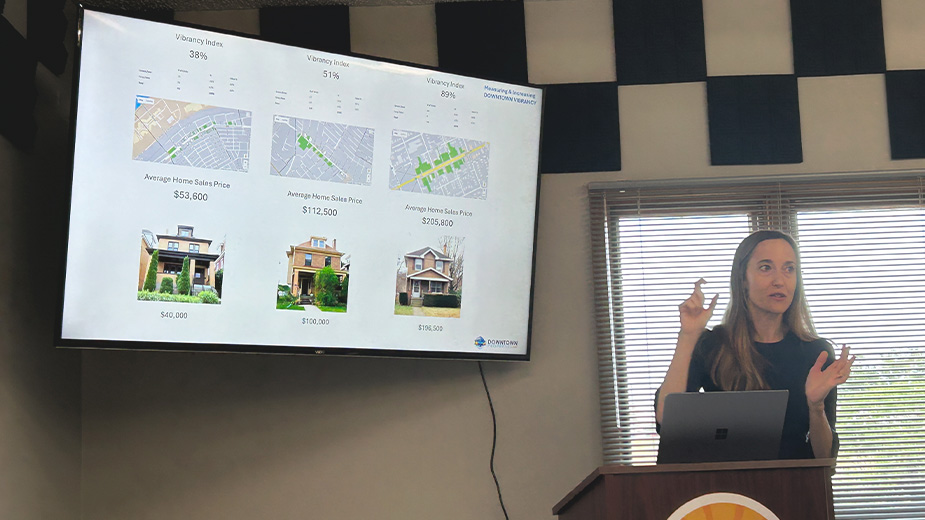City Never Turned Over Some Land Where Chill-Can Sits
YOUNGSTOWN, Ohio – Land that the city acquired for the stalled Chill-Can project more than three years ago was never transferred to the complex’s developer like it was supposed to, underscoring the lack of confidence officials harbored for the entire venture.
“We have been reticent as a law department to take any further action until we saw movement from the other side,” said city law director Jeffrey Limbian on Wednesday. “All we had were words and bad rhetoric.”
Limbian said the city put a stop on the land transfers until the developer, M.J. Joseph Development Corp., made progress on the complex – a proposed $20 million research and manufacturing campus dedicated to the production of the world’s first self-chilling can.
Despite a litany of promises including production dates and more than 200 new jobs, the Chill-Can development remains at a standstill. Since the project was first announced in October 2016, three buildings sit unused at the site, just a handful of people have been hired and not a single can has been produced.
Now, after years of production and development delays, the city is finally cracking down.
During a press conference Wednesday, Mayor Jamael Tito Brown announced that the city has placed Joseph Development Corp. and its CEO on notice that it’s in default of the two development agreements it signed with the city in 2017.
Should the developer fail to make good on its promises in 60 days, the city could take legal action to reclaim $1.5 million in grant money it awarded the project, rescind tax breaks given to the company and reclaim the land used for the development, according to a letter the city sent Joseph Development, which was released Wednesday.
Joseph Development owns title to about 75 parcels that it acquired from the Mahoning County Land Bank in 2017 for $55,760.
Under a development agreement signed in July 2017, the city was to acquire additional properties in the neighborhood, demolish houses and then relocate any residents to new dwellings. The city would then transfer the land to the Joseph Development Corp.

While the city acquired the lots and demolished the structures, the properties were never transferred and still remain under city ownership.
According to documents obtained by The Business Journal, the city’s Board of Control in December 2017 approved a measure to transfer 35 lots on the city’s east side to Joseph Development Corp. in order to complement land the company had already assembled for the project. The measure was approved during the last days of former Mayor John McNally’s administration.
McNally lost the 2017 election to Brown, who took office in January 2018. The new administration and law director, Limbian, put a stop to the transfers, the law director said. “We stopped transferring anything,” unless the developer was showing progress on the project, he said.
Brown said Wednesday that he wasn’t sure where the city-owned parcels were located or whether Joseph had constructed any buildings on them.
However, some of the city parcels lay in the heart of the Chill-Can development, records show. Using a parcel map of the area that was included in a blight determination study in 2017, it appears that the footprint of at least one of the Chill-Can buildings overlaps a small lot still owned by the city.
The Chill-Can site is bound by the Himrod Expressway to the west, Oak Street to the north, Himrod Avenue to the South, and North Fruit Street to the east.
Company CEO Mitchell Joseph’s great grandfather founded the Star Bottling Co. on Lane Avenue in the 1920s, which serves as the main thoroughfare through the development. That family connection – and some urging from Youngstown State University President Jim Tressel – convinced Joseph to bring the project here instead of to a potential location in Columbus.
Now, the city wants the developer to either finish the project or face consequences.
“This project has been on for some time,” Brown said, noting that it dates before his administration took over. During his first and second year in office, the mayor noted that some progress was being made at the site and he regularly kept in touch with Joseph and company officials.
However, Brown said he became tired of hearing the same response from Joseph that he was close to securing a large contract and production would begin.
“I kept hearing the same story over and over,” he said.
Brown said the city spent a significant amount of public dollars to help the project in order to bring jobs to the city, jobs that are nonexistent.
Under one agreement, the city awarded the developer $1.5 million in grant money through its wastewater fund that was used to demolish a neighborhood and prepare the land for development.
A second enterprise zone agreement provided a generous 75% abatement on real estate taxes over a 10-year period. The city also spent an additional $360,000 to purchase and demolish a patchwork of occupied homes, and relocate residents of the neighborhood to other dwellings.
In return for these incentives, Joseph pledged to construct a warehouse, bottling facility and a plastics facility by Oct. 1, 2017 and bring at least 237 new jobs to a depressed section of the city.
According to the enterprise zone agreement, Joseph was to create 50 jobs during the first two years, 100 new full-time jobs during years three and four, and another 87 jobs during year five. The job creation period began on Nov. 1, 2017, documents show
None of these metrics have been met and the city now is forcing Joseph’s hand by demanding he make good on his promises within 60 days.
According to a letter drafted by the city’s outside counsel, Joseph Houser, dated March 26 to Joseph, the city outlined its potential course of action.
“You have failed to complete your obligations as set forth in the agreement and the city can no longer ignore the defaults by your company,” the letter says. “Failure to cure these defaults could result in litigation and demand by the city for repayment of the grant funds provided for this project.”
Limbian also acknowledged it would also include measures to reclaim the property.
Brown acknowledged that this is a “first step” before any other steps could be taken. As of Wednesday, Joseph Development had not responded to the city. Joseph did not respond The Business Journal’s requests for comment.
“Their benchmarks have been missed, and we have now moved on to legal options,” the mayor said. “We displaced residents, were promised new jobs – those jobs have not happened.”
The mayor said that the best-case scenario is future job creation at the site. “I would rather have the jobs than the three buildings that are empty out there. We know we need these jobs.”
Officials are not optimistic.
“We’re still in the weeds and we hope something viable can come out of this,” Limbian said. “Although, I think over the next year or two if you have cans that do need chilled, then you’d better buy ice.”
RELATED
In Depth: City Says Chill-Can in Default of Tax Break, $1.5M Grant Agreements
Video: Youngstown Sends Default Notice to Chill Can
Pictured at top: Youngstown city law director Jeff Limbian and Mayor Jamael Tito Brown at a press conference announcing the city’s pursuit of a clawbacks from the developer of the vacant Chill-Can site on the East Side.
Copyright 2024 The Business Journal, Youngstown, Ohio.



